|
Posted by Romy the Cat on
02-16-2007
|
|
Whoever followed the following thread:
http://www.goodsoundclub.com/LatestPosts.aspx?ThreadID=2974
kind of know what was brewing with Macondo tweeter. Over the last couple months I was working with RAAL Company
http://www.raalribbon.com/
on a project of making a new tweeter for Macondo. The requirements were simple:
1) As high as possible sensitivity
2) As light as possible ribbon
3) As small as possible back chamber
4) As wide as possible horizontal diagram
5) Did I mention Sound?
When I exposed the RAAL’s Alexander to what I wanted he told me that he know exactly how to make this tweeter, had already a number of ideas and told me in fact he always want to have customers who would persue that type of “extreme” designs. Over the course of the project I had a great number of positive experiences, the experiences completely unexpected form a high-end manufacture. I’m not use to deal with manufactures who actually mean what they say and who have intentions and “meat on the bones” behind their “phraseology”…
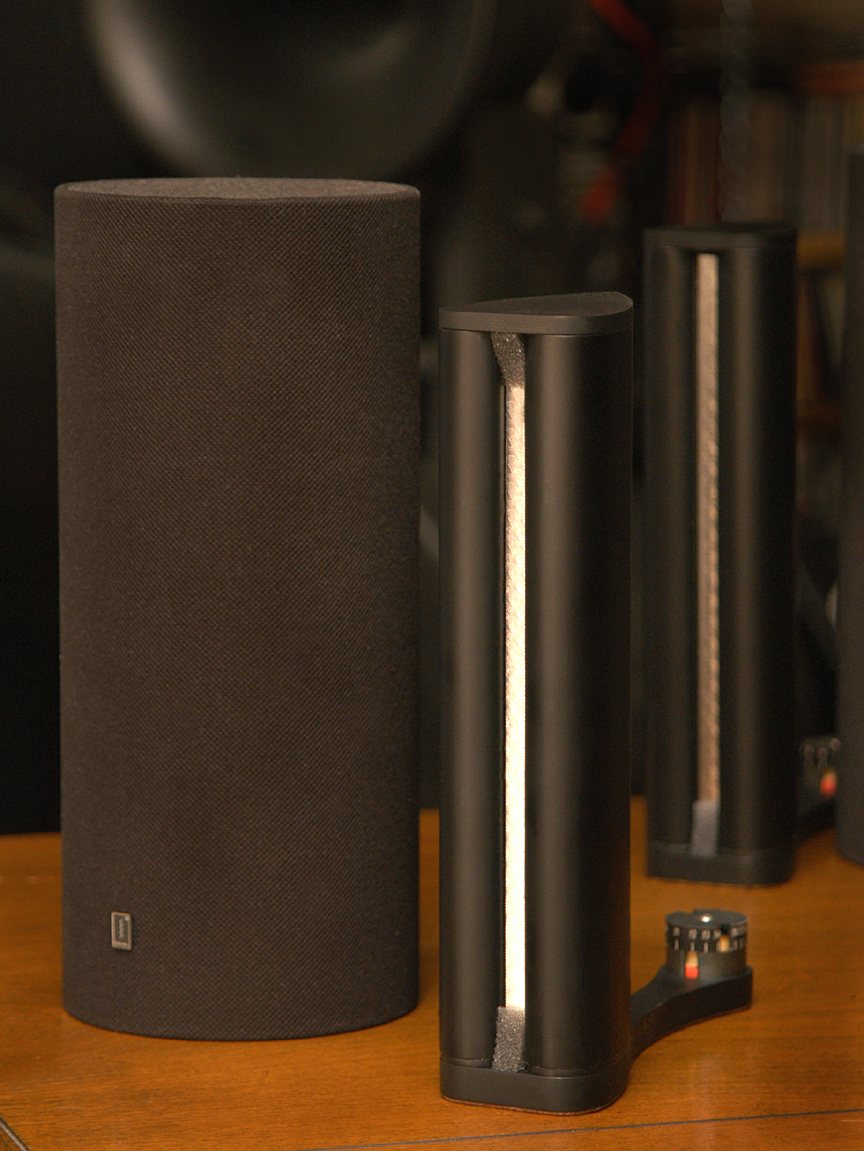
Anyhow, as this point I would not comment at the RAAL “Water Drop” tweeter’s Sound. I have the initial feeing but I need more time to interpret the results. Ay this point I would juts post the picture of the tweeter. Alexander, I’m sure had fun what I told him that I would like the tweeter have cheeks and the ribbon sit in there as in the ass’s crack. Alex converted the idea of the “tweeter in an ass” into the Water Drop shape and I think he did a wonderful job. The 120 horizontal degree, 109dB and the 1.25T in the gap… I will be fin to make the RAAL “Water Drop” tweeter to sound proper in Macondo. I will be reporting the progress, my observations as the results.
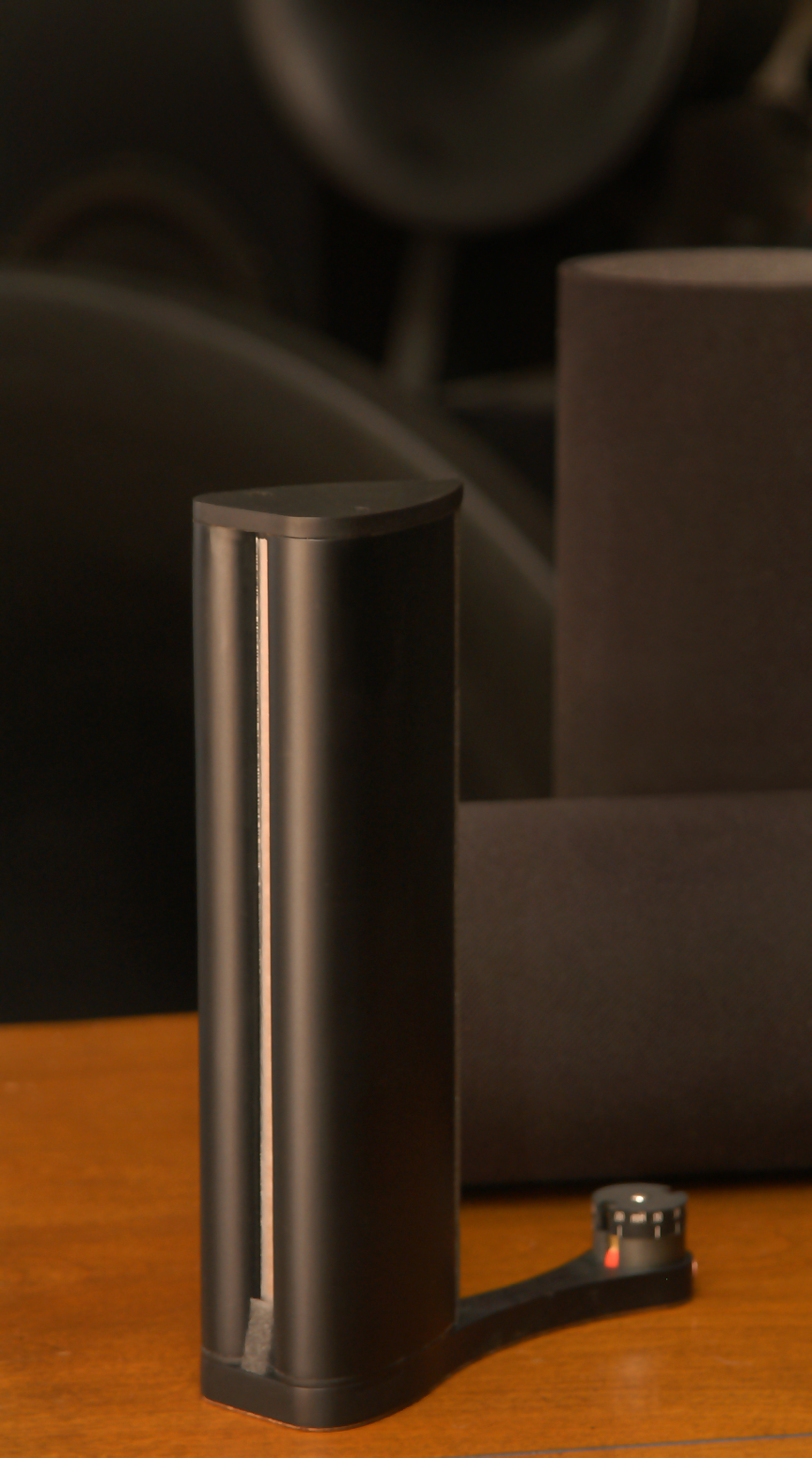
|
|
|
|
Posted by Romy the Cat on
02-17-2007
|
|
After spending a day with RAAL’s “Water Drop” tweeter, trying to make a mounting harness for it I have to tell you that it almost a nightmare to handle it. Around this tweeter I was forced to recognize all objects I my room on magnetic and non-magnetic. Generally it is not complicated to do. What it complicated with this driver is the punishment if you make one single mistake. This driver acts like a back hole – an magnetic objects fly toward and any “kiss” of any object with this driver it absolutely terminal for the driver. Whale I spent a day with the tweeter, experimenting with it and while I was making the mounting harness I had at least a half dozen accidents when I could destroy the tweeter, no mater how accurate I thought I was. Thanks God the tweeter comes with own protective enclosure and thanks God I made a rule for myself do not remove the tweeter from it’s enclosure unless the tweeter installed in it’s default position to play music. So I did followed the rule and as the result none of those dozen accidents make any difference. With that external enclosure the tweeter would be dead many time over.
Alex, have warned me many time over about it. She shipped the drivers in a magnetically shield double boxes, surrounded with dozen warning labels. I have measured that the “Water Drop” driver outside of it’s externals plastic enclosure (that had working title “the Condom”) the driver produces 80mT. I thigh it is not a big deal. Well, considering the consequences – it is a big deal.
So, if someone would experiment with a similar drivers then do yourself a favor: do not remove the driver outside of firms protective box unless it ready to play and do not even censed to use this time of driver if it has no such “Sarcophagus”…
Wow, I literally revealed that the drivers now are installed in the Macondo and the tribulation charring of the tweeter are over…. Now it is the time to talks bout the RAAL’s “Water Drop” tweeter’s Sound….
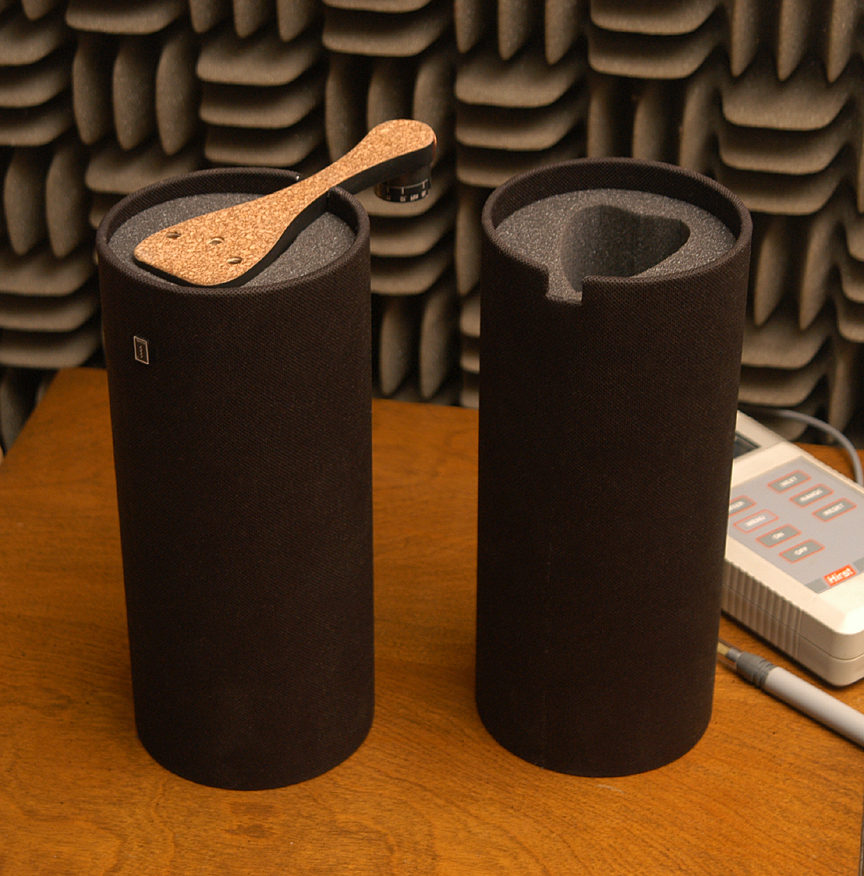
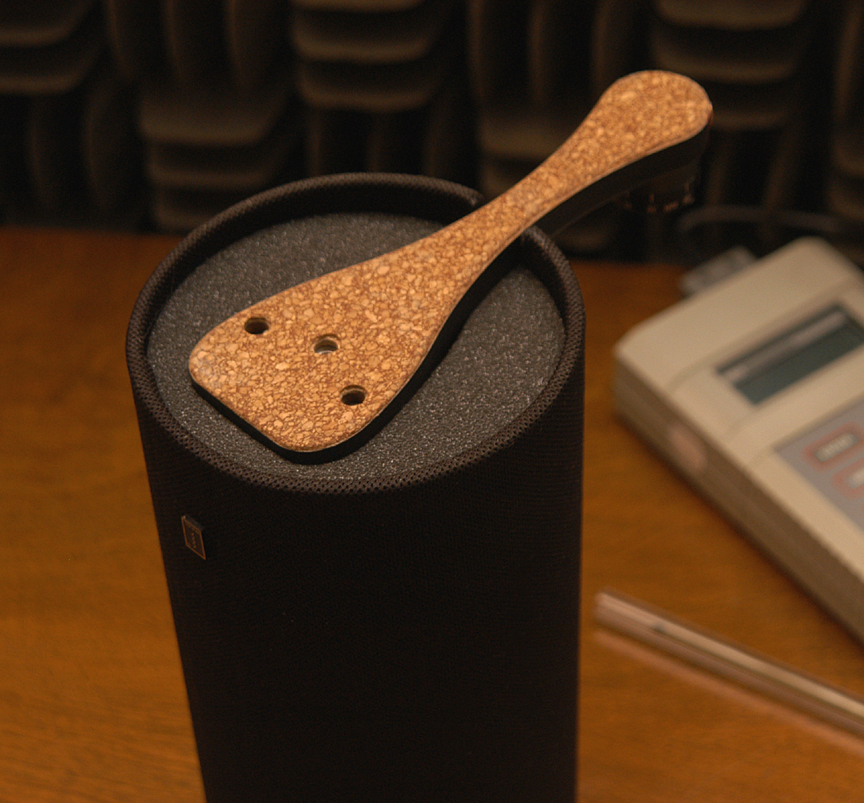
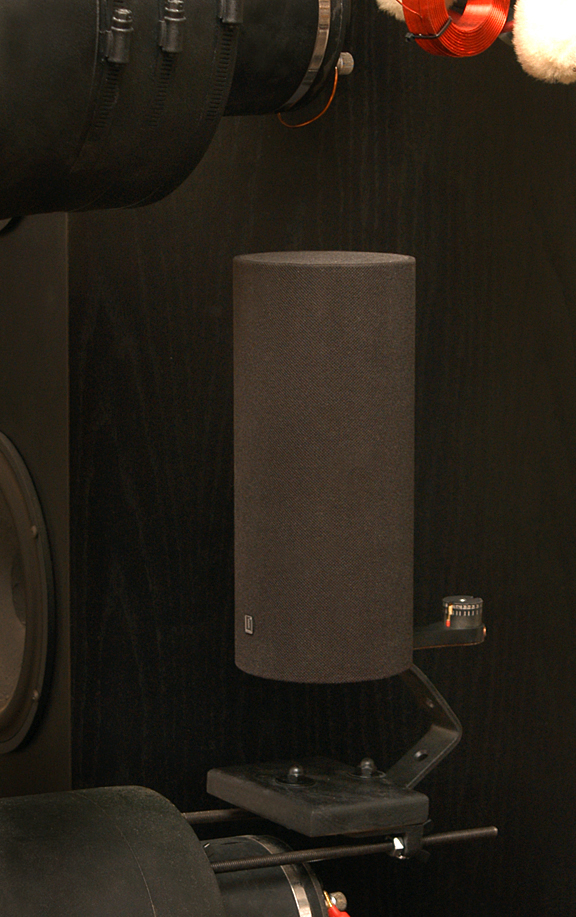
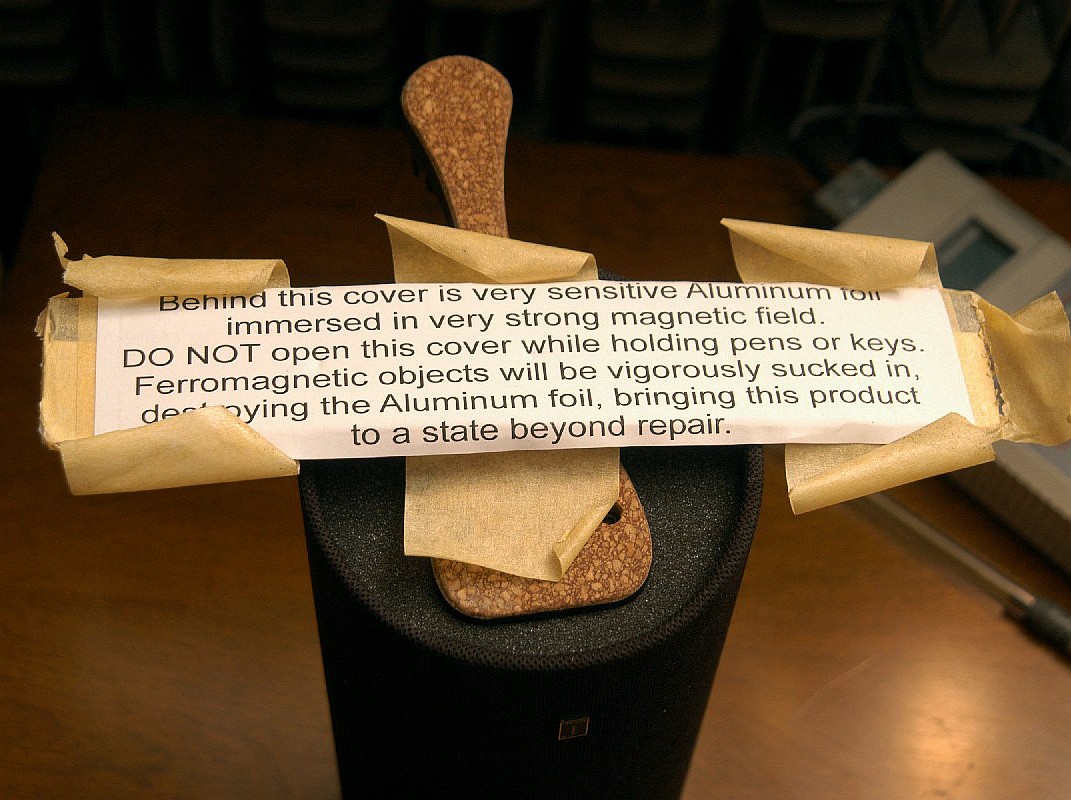
|
|
|
|
Posted by Romy the Cat on
02-17-2007
|
|
It is complicated. Any tweeter is different and the RAAL’s “Water Drop” tweeter is more different then others. Almond any other tweeters that I heard this tweeter has something absolutely unique- it has no annoying upper MF nose. When I asked Alex to make the tweeter in the shape of bat’s cheeks with no front baffle of any kind I meant to crate an environment when the HF protuberances would have no surface to bounce off. The design of “Water Drop” tweeter accomplish it as perfectly as it theoretically possible - as you also see at the picture there are no baffles or even any boundaries in the driver mounting…. Well, I do not know what the real reason for the tweeter’s absent of ambient upper MF noise – I presume that it is the driver’s shape but it also might be the driver’s ribbon, or the suspension or whatever else Alex did in there. However, the amnient noise is not there and it is kind of “different”. The practical difference is that by dropping crossover point the MF just become more presented and ... nothing ELSE happen. I never heard it before as any single tweeter that I tried along with dropping of crossover point and picking some MF tone the drivers also picked some MF “dirt”. This "no noise" inimitable and the VERY lucrative quality of the “Water Drop” tweeter are a great benefit but at the same time it is great labiality. Let me to explain…
If I use some kind of JBL 2440 or anything else that dies out at 8K then the “Water Drop” tweeter would be the God sent. From what I have seen, the second order or high transition slope does not work well with this tweeter. The 8Ohm “Water Drop” works beautifully when it sits behind.8uF-2uF (with limited power). However, the Vitavox S2 runs up to 12K and it has some "inflection" at its upper range. When I inject inot S2 driver the “Water Drop” at 10K with first order then it begin to override the S2. Alex suggests attenuating the “Water Drop” but I do not see at as a solution as I would need to kill a LOT of decibels.
So, it is kind of ironic. The “Water Drop” itself is wonderful. It has no toneal problem to be ingrate with S2. It has the cleanness and the accuracy of TAD PT-9R but it almost 20 dB more sensitive (!!!) and has no upper MF annoyances. However, I at this point I wonder how I might use it with S2 if the “Water Drop” wants to take over my upper MF range. I do not want to let the “Water Drop” to care my upper MF range as I find the Vitavox S2 is more interesting in there but the “Water Drop” (so far) begins to show off an attitude when I strip from it it's upper MF… So, go figure… Will post later the firther progress…
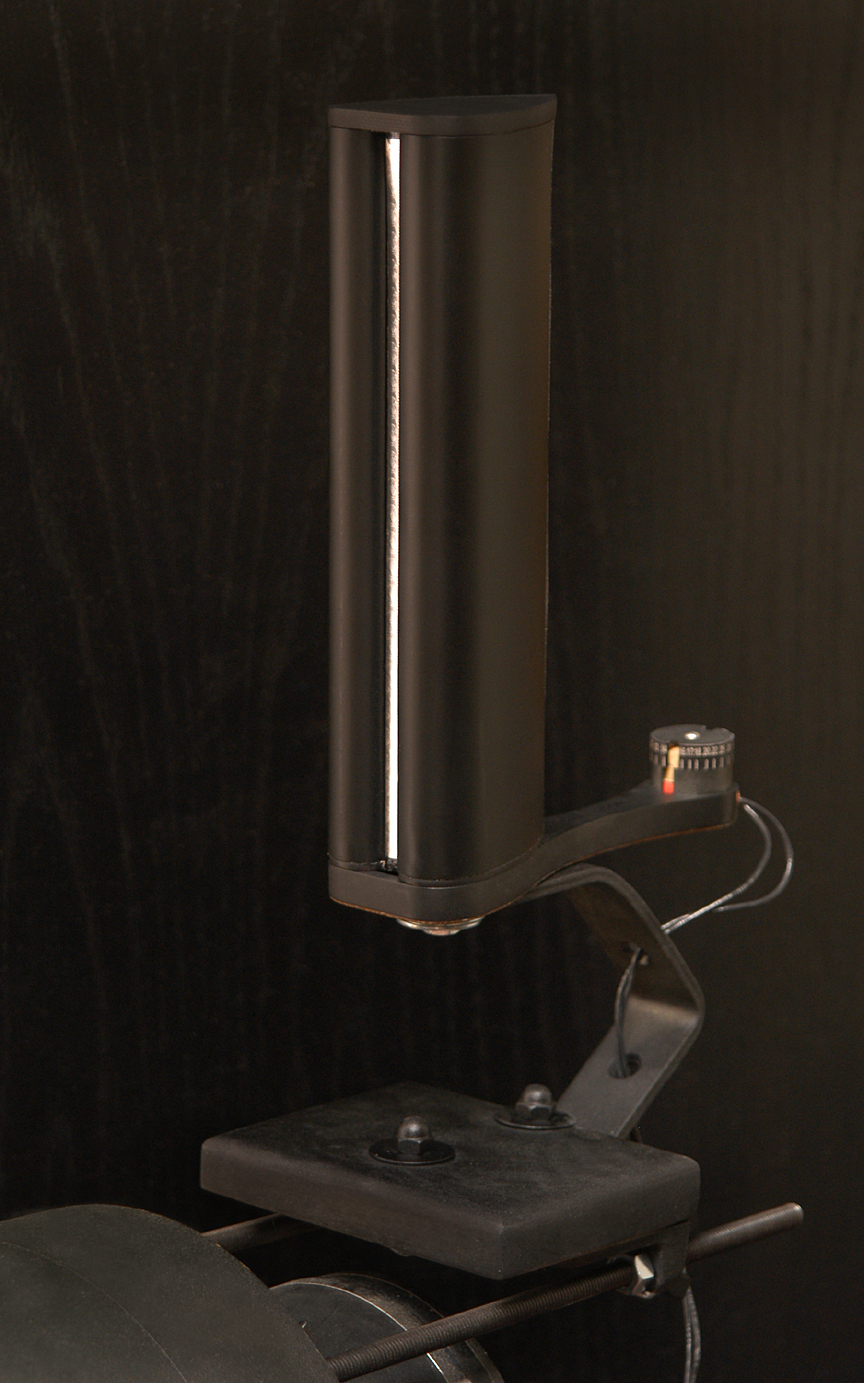
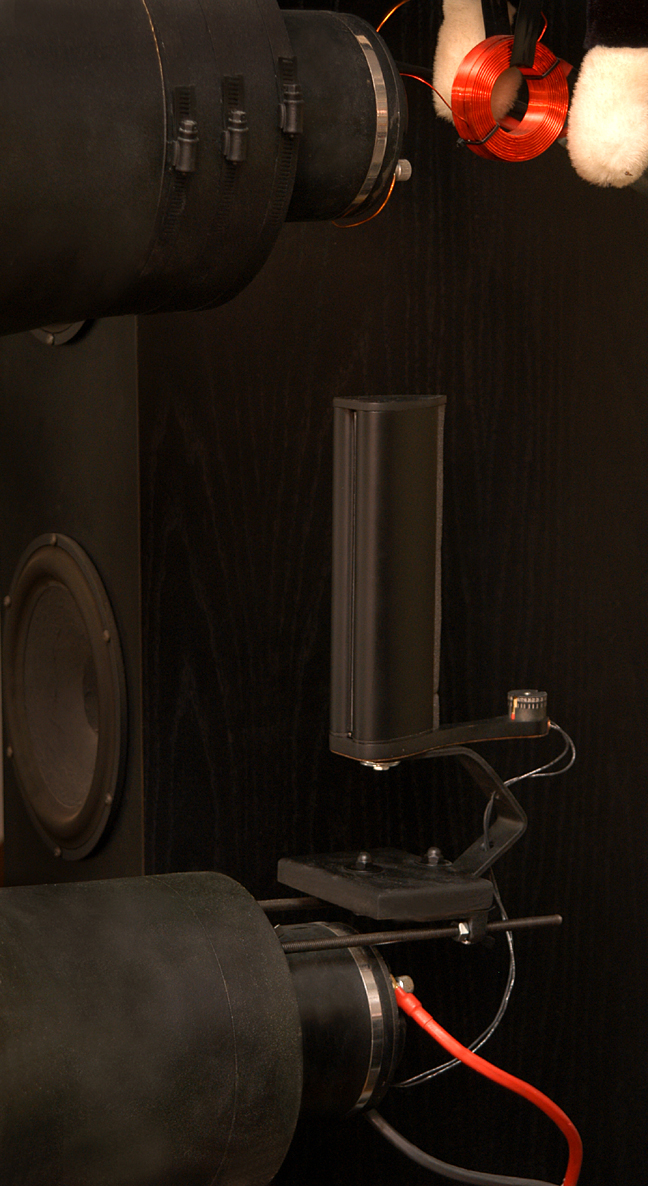
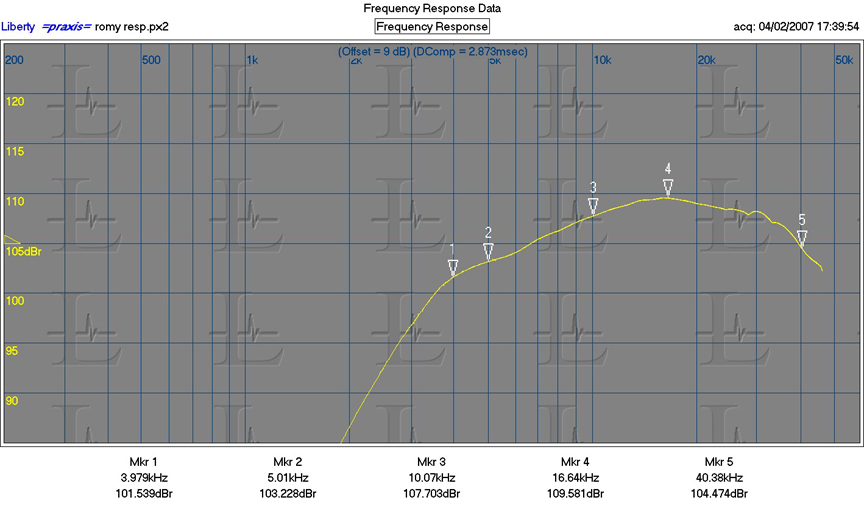
Measurement courtesy to RAAL Advance Loudspeakers.
|
|
|
|
Posted by Dominic on
02-18-2007
|
That is one good looking ribbon driver.
It almost looks like an ideal solution. Sure looks smarter than other ribbons.
|
|
|
|
Posted by Romy the Cat on
02-18-2007
|
|
My excrements with the RAAL “Water Drop” tweeter are gong on. It looks like it much more complicated to make it to work in Macondo but I hope I will get there. I have some preliminary feeling about the drivers but they are too row and I do not feel that at this point it would serve any public purpose to pass it on.
Meanwhile, since I always skeptical to what manufactures says I was trying to determine the real sensitivity of the “Water Drop”. Usually I measure sensitivity in relation to my Vitavox S2. The S2 I did run at 1W and measured exactly 109dB.
So, 4 drivers were sitting at the very same position driver form the vest same amplifier and my celebrated instrumental microphone was positioned at listening location. I fined the drivers with a sweep from 2K to 20K. The test does not gibe you the absolute reference values but it perfectly illustrated the relative decay and also very nicely portrays the natural response of the drivers.
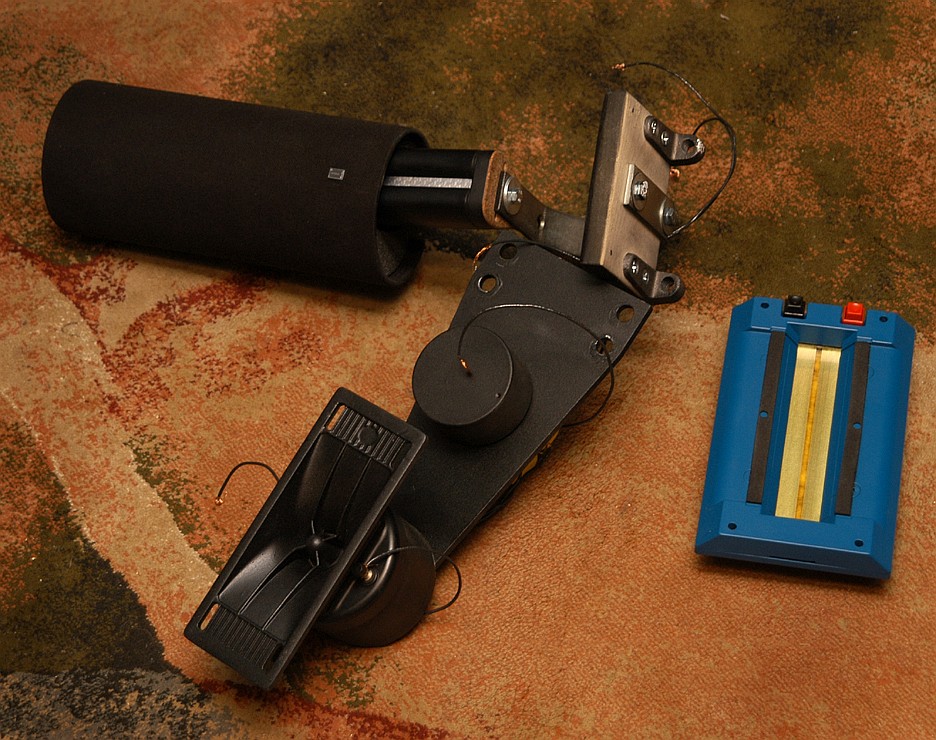
Below is a reference response of the 15R Vitavox S2 with no filter of any kind. It well shows BTW the plastic diaphragm’s “bulge” from 3.8k…
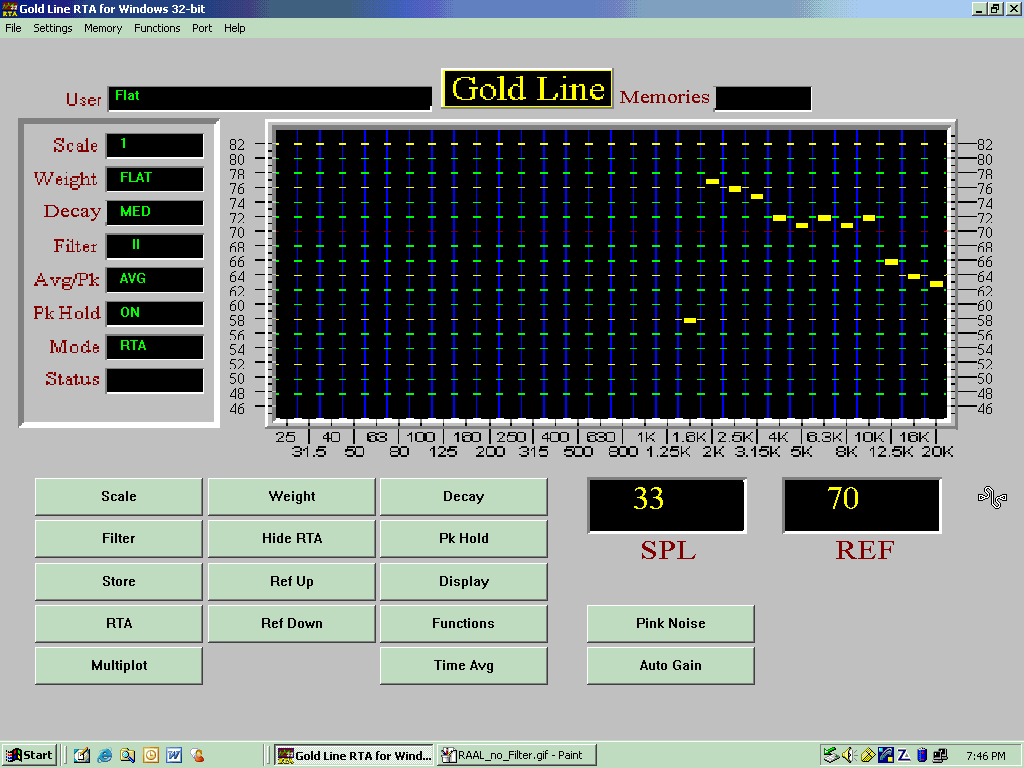
Next below is the response or EV T350 with 8R cone and no filter. It is rater at 110dB so it is. Pay attention that it is essentialy an upper MF driver with a sensitivity equal Vitavox only at 10K.
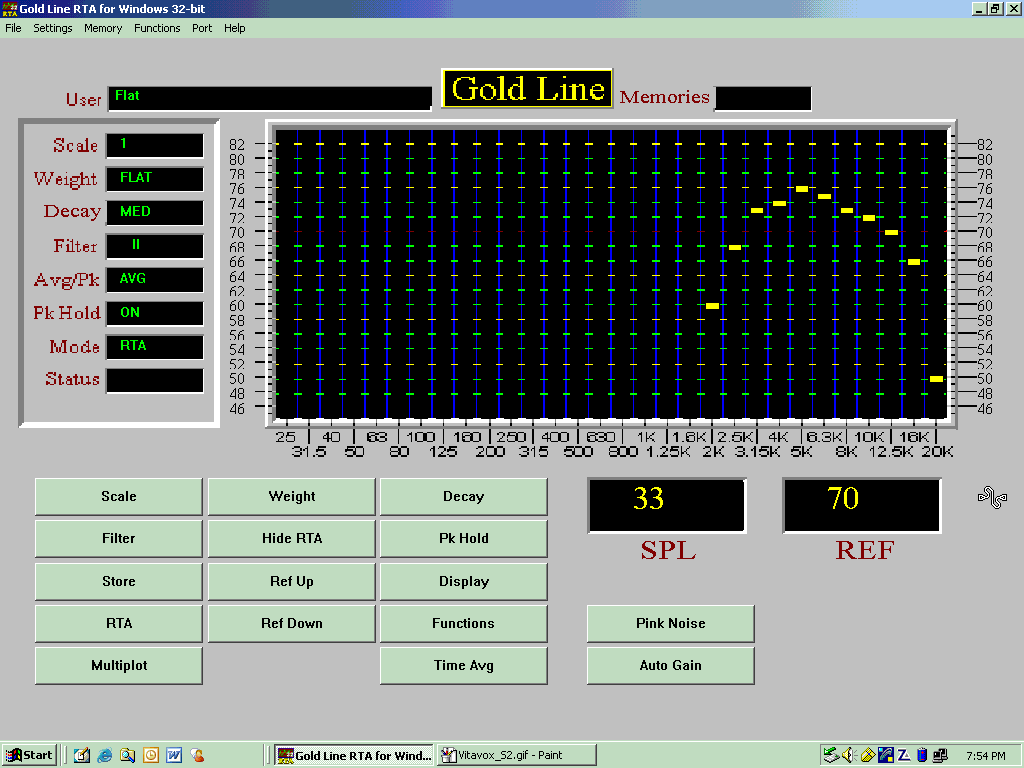
Here is below a Staging Acompany SA8535 driver with no filter. A semi-ribbon with 94dB rated sensitivity. No wonder that professionals use it with 4th order filter…
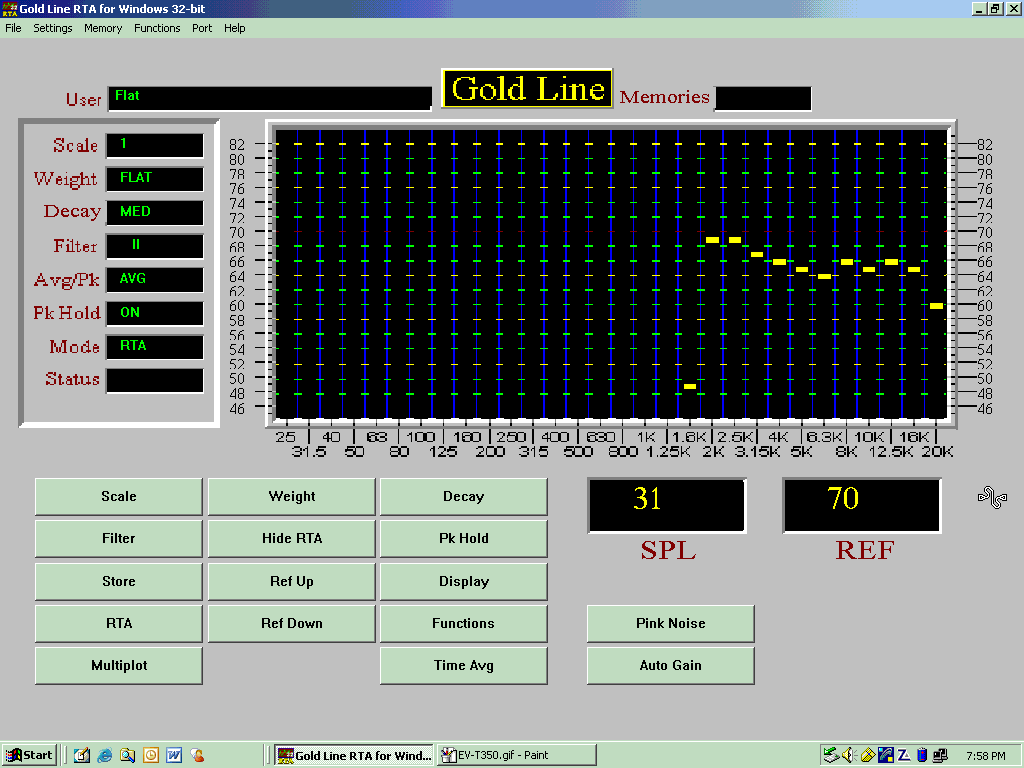
Eventually, here is below the RAAL “Water Drop” tweeter. It looks like it goes the Vitavox S2 sensitivity and it goes it at the necessary frequency. This sweep was beyond a 1.8uF cap. The driver without the filer has the identical response only with ¼ octave extension toward LF. Beside it, the SHAPE of the sweep of the opened driver with no filter is virtually identical to what you se below.
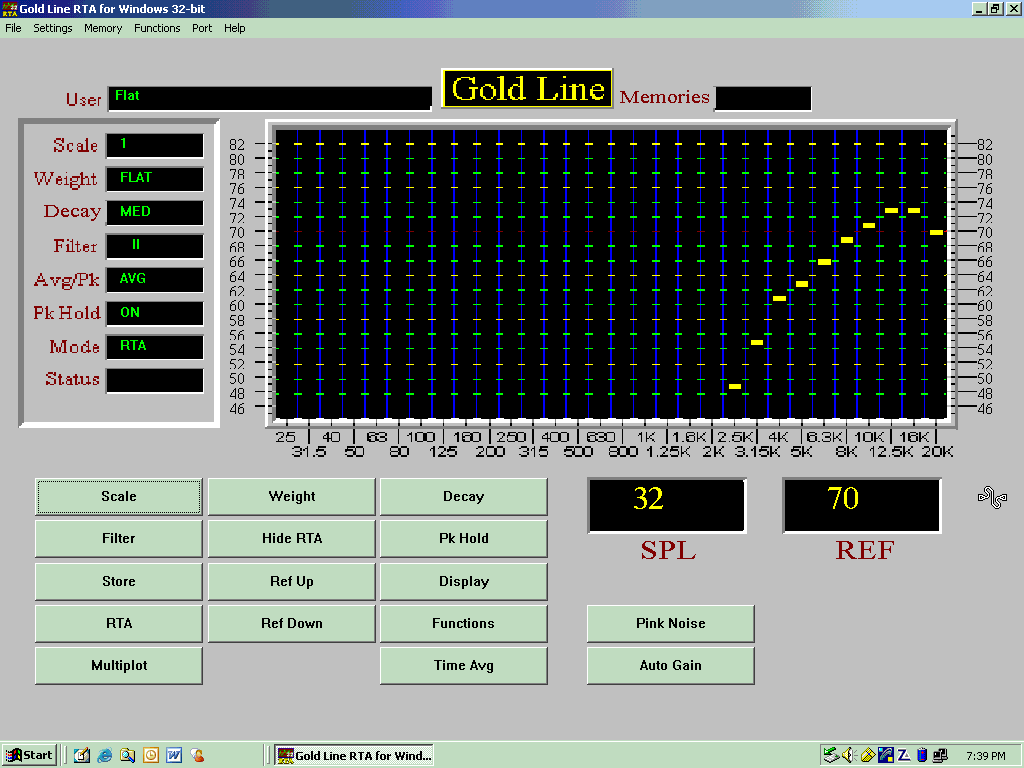
|
|
|
|
Posted by Paul S on
02-18-2007
|
That is one textbook HF ribbon, Romy, long, narrow and naked as a jaybird.
Don't be surprised if eventually a certain amount of magnetic "dust" somehow finds its way into that ultra-strong magnet gap. Who knows what it is or where it comes from, but it's a PITA to clean out of there.
I just put in "naked" Audaphon ribbons over 2 uF caps + coils and I was quite pleased as the ribbons' response settled down over time until, just as you have described, the principal effect became more like better MF transient "attack", or something like that. Although "rated" the same, the "naked" Arum Cantus did not do this, and I presume that's because the A.C. did not actually meet its sensitivity specs/was too weak for my speakers. Past electrosatic panel HF arrays have not had this "MF transient" effect, BTW, despite careful level matching. No "naked" HF ribbons I have tried have accentuated noise, nor did they harden sibilants, and vocals are rendered with nothing more than greater clarity, in my experience, or the ribbon can be dialed in so this is the case. The "attack" thing is a bonus!
Do you actually prefer the S2 at crossover frequencies, or is the problem driver compatibility, or is it just too much sound at crossover? If you have the power to burn, why not scrub a dB or two off the ribbon, or just stick with the 2 uF cap on the ribbon and taper off the S2 HF in order to blend them?
Anyway, maybe the ribbons will still settle in some more yet. I am curious to see what happens in your system, but I would guess that if they are going to work at all with the S2s, then the new ribbons and S2s will wind up "lapping", at least some, one way or the other. I don't know about MF benefits if the ribbon is crossed over much higher than 10k, because I've never tried crossing over higher than that for long enough to get a handle on it.
Great looking ribbons!
Congrats on the successful relationship with RAAL. Very encouraging to hear about it.
Best regards,
Paul S
|
|
|
|
Posted by Paul S on
02-18-2007
|
I juts looked again at the picture.
Romy, please keep that naked ribbon away from the floor!
I already mentioned about magnetic "stuff" floating around in the air (???), but the floor is a real no-no!
No doubt you are neater than I am, but there's still likely to be all kinds of magnetic crap down there!
Best,
Paul S
|
|
|
|
Posted by Romy the Cat on
02-19-2007
|
 Paul S wrote: Paul S wrote: | | Do you actually prefer the S2 at crossover frequencies, or is the problem driver compatibility, or is it just too much sound at crossover? If you have the power to burn, why not scrub a dB or two off the ribbon, or just stick with the 2 uF cap on the ribbon and taper off the S2 HF in order to blend them? |
|
Nope, I prefer at this point to let the S2 to do what it does and do not roll it off.
 Paul S wrote: Paul S wrote: | | Romy, please keep that naked ribbon away from the floor! |
|
Ah, believe me or not but before to laying the tweeters there I spent quite a time to vacuum this floor. BTW, did you not that the RAAL driver sits the face up and that I never took if from the condom while I was in the floor? Yes they are ferociously brutal and I absolutely convinced that if any manufacture would make these “bare gap driver” commercially then they shell force buyers to sight an affidavit that a customer use the driver at own risk with no warranty of any kind.
|
|
|
|
Posted by Romy the Cat on
02-19-2007
|
|
I detected that the Water Drop tweeter has VERY interesting ability to react to the stage of out stage. I am driving the Water Drop with a full range Melquiades SET. As you know the full-rage Milq use a moderate Lindale transformer with a juts 200mA gap. So, the usual cruise operation of the Milq is 230V at 180mA on a full 6C33C… What happen when current run over or near 200mA. The transformer dives saturation… but what happens with Sound? Of course it goes gown, the question is how much down? Usually the saturated transformers very easy spot by bass, well not VERY easy but it is audible. However with Water Drop it is very different. As soon the plate current approaches to 195mA the sound of tweeter changes Boolean-like and become a razor-sharp hard and VERY brutal. I have seen some tweeter react to SET saturation but I never seen so aggressive reaction. Any explanation why?
|
|
|
|
Posted by Romy the Cat on
02-19-2007
|
|
 Romy the Cat wrote: Romy the Cat wrote: | | I detected that the Water Drop tweeter has VERY interesting ability to react to the stage of out stage. I am driving the Water Drop with a full range Melquiades SET. As you know the full-rage Milq use a moderate Lindale transformer with a juts 200mA gap. So, the usual cruise operation of the Milq is 230V at 180mA on a full 6C33C… What happen when current run over or near 200mA. The transformer dives saturation… but what happens with Sound? Of course it goes gown, the question is how much down? Usually the saturated transformers very easy spot by bass, well not VERY easy but it is audible. However with Water Drop it is very different. As soon the plate current approaches to 195mA the sound of tweeter changes Boolean-like and become a razor-sharp hard and VERY brutal. I have seen some tweeter react to SET saturation but I never seen so aggressive reaction. Any explanation why? |
|
I asked the RAAL’s Alexander this question and here is his reply. It sounds very rational.
“As for the plate current, any clipping or saturation creates HF rubbish. You are dealing with extremely sensitive detector of what is contained in the signal. I was telling you before of it's ability to detect (play) microamperes of current, meaning no compression or low level signal masking. In clipping or saturation events, the amp generates infinite number of HF harmonics. They are low in level but their real amount usually stays undetected with regular tweeters or mediocre ribbons. In short, rubbish in-rubbish out. As it successfuly detects such events, it also brings out every bit of rubbish that you might have in the system, all the way to the mikes used during recording. This may sound like propaganda bullshit, but in time you will see what I mean.”
|
|
|
|
Posted by Romy the Cat on
02-19-2007
|
|
OK, after a few days to straggling with this damn tweeter I might report that the Water Drop actually made itself to sound civilized. It sounded somehow fine alone but it was a real nightmare with Macondo, I juts was not able to integrate it. I measured it and I detected that the Water Drop sinks my Vitavox’s output as if it runs out of phase with it or has impedance of .2 ohm. I measured the tweeter with reversed phase (I did not measure the fact of reversing acoustically but juts reversed wires) and saw the same almost dive 10dB down after the crossover point. The sound was too wrong, juts very much wrong. I really wonder what it going on and I begin to invent filters, diffusers and ribbons loading in order to soften the sound of this tweeter, the sound that was too ribs-pinching. It sounded like a typical harsh out of phase tweeter but my acoustic phase tester:
http://www.gold-line.com/apt2.htm
said that the MF and HF channels were IN PHASE. I have measured it 20 times and did not believe that the tester is wrong. I use this tester for 10 years and this tester is very accurate and I very much trust to it. I mean within my playback I for years never ever cared in where is positive of negative, where it red or black terminals. I connect everything as is” and then I test each driver’s polarity…. Anyhow I was really was wondering what the hell is going on…
This morning, I desired to re-test everything again before I put the tweeter in the long box of projects then went south. Among many other measurements I was making the sweeps with tweeter in and out phase. Suddenly when I begin to see as my RTA was printing the sweep out of phase I said” Holly shit!”. It eventually looks like the MF channels did embrace the tweeter!!! Wow, how the hell I missed it before!!!! Perhaps I reversed the wires twice when I measured it before… Anyhow, I was sa exuberant and could not wait to put everything back in operation to listen now how it will sound.
Of course it was absolutely different and it was absolutely CORRECT SOUND this time. There was not conflict between S2 and the Water Drop anymore. No tweeter anymore was screaming BEHIND the MF and there was no “HF “clipping”. If fact it was very smooth now, very extend and VERY peaceful... Who could believe that I can find peacefulness during the President Day. This President!!! Anyhow, it is not time aligned yet and it probably should be attenuated for a few decibels (not for 12-15db as I was trying before) but it is already, compare to what it was yesterday, is a “giant leap for mankind”… Now the minor satellites are left but those satellites are perfectly rational and manageable. Evan without the “minor satellites” from what I’m get now from the Water Drop it promises that it will be a phenomenal performer. I am playing now the James Levine with Chicago crashing through the “Porgy and Bess”… The “Water Drop” sits with 6db/octave at 12K and the Macondo with Chicago 1993 does wonderful, just simply wonderful… it is slightly bright but DESPITE OF THE BRIGHTNESS IT HAS NO SIGNS OF HARSHNESS or hardness. It was VERY much what I was hopping for.
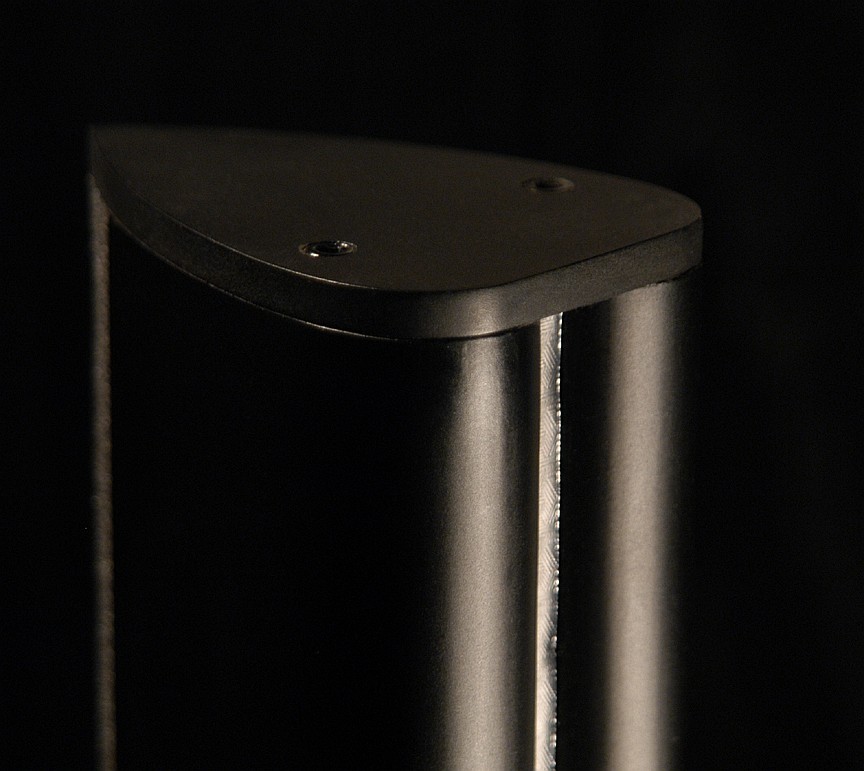
I still would like to hold my more or less final observations as I would like to see how it will be when it will be all dialed-in correctly. For now, let to think why I demonstrated the audio-Moronity™ during the last few days. I used 6db/octave crossover, juts a single cap and a single cap NEVER reveres any phase in speakers. Sure, it has 90 degree shit but over the years, playing with many drivers, I NEVER HAVE SEEN that the driver with 6dB should be reversed in phase. Well, I also hardly ever dealt with the drivers that have a transformer between filter and the coil. The Water Drop has a transformer with 3H inductance… so I had effective 1.5th order when the cap begin to roll at 12 KHz and then at the bottom at 4 kHz -5kHz the inductance of primary kicks in and forms with that cap a pure second order… Well, I thoght that this secondary rolls-off is too far away to affective and therefore it’s contribution would be negligible… well, not so simple….
Anyhow, now I feel much better and the future looks bright again… I will be posting more about the actual Water Drop’s sound when I feel I am ready… Rgs,
Romy the caT
|
|
|
|
Posted by Romy the Cat on
02-20-2007
|
|
I had today a couple listening sessions with the Water Dropped Macondo. It was amassing and …. a little strange . The tweeter does whatever I was expected from my imaginary “conceptually-perfect” tweeter but it also it does something new for me, taking the entire presentation to a very own direction. Frankly I was not expected and was not prepared for this result. I was expected just a very good tweeter and by means of it to good a supplement for my MF Vitavox S2. However, the Water Drop does more then that. Behind the benefits for entire playback improvement (I will take about it most likely in details later when I have time) the tweeter serves also as a powerful educational tool, demonstrating what is possible when it is possible. The most important, the tweeter shows what other methods of Sound influence to awareness are possible in sound reproduction. I was thinking about it a lot today as the Water Drop clearly showed some new possibilities and new opportunities. Some of theose possibilities I welcome with a violent enthusiasm, others I do not know yet. I need to think about all of it for a while. Whatever my further finding will be the extrasensual experiences that I got today with the Sound clearly justified to me the expenditure of the entire Water Drop project.
This amassing Water Drop’s ability to completely eliminated high frequency from sound reproduction and enable the brain do not review the credibility of Sound from HF perspective is not new to me but I never seen any transducer that does it as strongly and as convincing as the Water Drop does. That “Room Dithering” by the Water Drop combined with it’s completely not registerable by consciousness reproduction efforts is very fascinating. In addition I realized today that the Water Drop’s idiosyncratic elimination of the high frequency makes sound actually overly dramatic and filled with anxiety. It is like those feelings of coming summer rain when a few seconds before the first rain drop the air loaded with electivity, fear and anticipation. The Water Drop somehow change the air in the room with the same “quality of eagerness” and that makes “sound openings” in the room … quite dramatic.
Those things are is hard to understand to whomever did not experience it from an artificial media and particularly it is hard to understand for the people who did not talk to me personally and who are not tuned to my communication manners. Whoever lives in Boston I am sure will be witnessing it and I feel that to witness what the Water Drop does with sound in context of Macondo/Milq is very much worth to sell tickets… It will be continuing more when I feel I’m ready to share more….
The caT
|
|
|
|
Posted by Paul S on
02-20-2007
|
These are very interesting effects, all right. No way to be sure, I supppose, but if I understand you correctly this could be related to what I was calling the "MF attack" phenomenon, up the page. Although the air is charged with anticipation, yet one can never quite anticipate a note or musical effect before it happens, even with a familiar piece. It just makes you giddy. I was thinking I should try losing a few dB off the ribbon and then gradually bring it back up until it happens again, just to learn more about this. But why should increased HF clarity apparently extend to transients up and down the frequency range? It's like it makes all the notes and intentions less expected yet clearer, or vice versa, but that does not make sense, either way.
But I have never heard a HF-only ribbon with 109 dB efficiency, only the "pro" versions that they insist on running down to < 3k, even at modern concert halls, so you might well be on your own out there. At any rate, I don't know of anyone besides you who does not run truly HE ribbons lower. So who knows if the effects you mention are in any way related to those exhibited by other "good" naked ribbons used only for HF in compatible systems, or if you simply have a freak on your hands.
The "calm HF" effect is something I have long sought but seldom experienced from repro, and I have blamed the amps as much as the ribbons. Mere HF extension is not enough. Hard to say whether the amp or the ribbon is typically at fault, but either these ribbons via a crossover are a real bitch for any amp, or the ribbons themselves are very unforgiving of the amp via the crossover. In my experience an amp typically has as hard a time with these dinky-ass HF ribbons as it would with big LF drivers, and no doubt this has contributed to putting some people off the idea altogether.
Bets regards,
Paul S
|
|
|
|
Posted by Romy the Cat on
02-20-2007
|
 Paul S wrote: Paul S wrote: | | Although the air is charged with anticipation, yet one can never quite anticipate a note or musical effect before it happens, even with a familiar piece. |
|
Actually is has less to do with familiarity with a piece but I feel it more has to do with different things. What I observed that the Water Drop does is some kind of Room Dithering that set a “different” relation between the states: “Music sounds” vs. “Music does not sound”. You know there are people who build very interestingly sounding dedicated rooms. Well, nowadays there are many people who CLAIM that they do it but most of their room sound like shit. There are very few exceptions. If you are in Boston then stop by in the largest Goodwin's room…. Pay attentions that it is even a PHYSICAL PLEASURE to be in that room and to listen the room silence…. You do not even need to talk there as “something” in that rooms juts nails you down and force you to experience a “coming form nowhere” pleasure. There is something that the Water Drop does that reminds this filling… it sets total listening space perception with some kind of “other state”. I did quite a number of times attempts to stop playback when the track were playing but the music was not sounding yet and as soon I stopped playback I immediately felt that that the room literally collapsed. While the playback played the Macondo did not emit any sounds that I would consider significant. The MF and HF produces a very minor tape hiss (or course what the playback stopped there is no noise of any kind coming from the drivers) but the hiss was DEVILISHLY PLESANT harmonically. Perhaps it does something in the ultrasound, I do not know. However, whatever it does I want more of it as it makes me very addictive and almost hypnoses slavish to the state when the playback is playing…
 Paul S wrote: Paul S wrote: | | I was thinking I should try losing a few dB off the ribbon and then gradually bring it back up until it happens again, just to learn more about this. But why should increased HF clarity apparently extend to transients up and down the frequency range? It's like it makes all the notes and intentions less expected yet clearer, or vice versa, but that does not make sense, either way. |
|
Another interesting phenomena with the Water Drop – its volume is almost irrelevant. Alex suggests using the Water Drop with first order. I can see his reasoning and the Water Drop alone do sound beautiful with first order. I used the Water Drop with first order at 10K and all the way up on the slope, with the Vitavox wide opened and with Vitavox low-passed. It works fine ether way. Yes, with first order the Water Drop should be exactly dialed in. However, I do not use Water Drop as stand alone transducer and companioned with Vitavox I choose to stay with 12kHz, second order (the Vitavox upper range sounds more dynamic and more positively-granular then the Water Drop’s lower range). So, with 12kH, second order the volume of the Water Drop is way less relevant. I for instance (having the Water Drop running at the same output as Vitavox) feel that now I have too much outs on the tweeter. However, I have no negative feelings that would incentive me to reduce the tweeter volume. I mean WHATEVER WE ASSOCIATE WITH EXCESSIVE HF: noise, brightness, coolness, change of tonal balance is juts NOT HERE withy Water Drop’s at all. I mean I can perfectly ad or to reduce a few dB on Water Drop with practically no affect to sound. The change of the Water Drop volume changes the way how the Water Drop “softening” and “enveloping” the system but it hardly affects any of conventual Hi-Fi property of the playback…. Invigorating, isn’t it?
 Paul S wrote: Paul S wrote: | | But I have never heard a HF-only ribbon with 109 dB efficiency… |
|
Hm, I have a suspicion that it is not only about the efficiency but about something else the RAAL’s Alexander did. It is fascinating that the Water Drop does not sound as 109dB sensitive in a way in shich I use to perceive “sensitivity” in context of MF and LF drivers. In fact it more sounds like 50dB sensitivity driver as it has no “auditable” by my mind dynamists. Sure it is the 109dB sensitive (look at the sweeps above) but it apparently show off own sensitivity in different dimension, the dimension that I am not accustomed to register with my listening awareness.
Rgs,
Romy the caT
|
|
|
|
Posted by Romy the Cat on
02-20-2007
|
 Paul S wrote: Paul S wrote: | | The "calm HF" effect is something I have long sought but seldom experienced from repro, and I have blamed the amps as much as the ribbons. Mere HF extension is not enough. Hard to say whether the amp or the ribbon is typically at fault, but either these ribbons via a crossover are a real bitch for any amp, or the ribbons themselves are very unforgiving of the amp via the crossover. In my experience an amp typically has as hard a time with these dinky-ass HF ribbons as it would with big LF drivers, and no doubt this has contributed to putting some people off the idea altogether.’ |
|
Here is the subject! Under no circumstance I presume that I have my final opinion about it but here are my up to now experiences of dealing with the Water Droop’s peripherals.
The people who know me know that I would not BS myself and others and it I stuck with Melquiades then I have very strong, not ego driven, reasons to do it. I do not have any other amps in my listening room now besides a full-range Melquiades and the Super Melquiades DSET. So, when I was driving the Water Droop stand alone I was using full-range Melquiades with Vintage EVS attenuators in the Milq’s input (they use to be phenomenal and had absolutely transparently sounding devises). All cables in the system are PAD Domonus, not the todays but the “older”… if you know what I mean. The sound of the “bare Water Droop” was OK with firs order but complete dies with second order at 12kHz. Also, when I moved up on the transition slope with first order the sound very much craped out below 0.8uF it…
Alex suggested that it is the way how it should be as HF over 12Khz there is no musical information but juts noises. Well, I did not really subscribe it and blamed the Alex’s transformer, my filter or whatever else I was able to blame. Alex also suggested that a ribbon should sound better when some LF harmonics supplement it’s HF “noises”… Well, looking what I heard from Water Droop he was correct. Still I was annoyed that a stand-alone driver did OK with first order turn to sound so crappy with second order…. I never seen that a pass-band would be so affected with the filter change…
Well, when I reversed the phase and was able to ingrate the Water Droop with Vitavox then I recognized that I can completely painlessly do go for second order with no negative effects to sound. Initially I thought it is because my Vitavox provide that so necessary for the ribbons” LF harmonics supplement” then I began to question it. I asked myself why the sound does not turn crappy with second order as it use to be what I was driver juts alone Water Droop? Perhaps Alex was correct and the “HF artifacts” should not be head alone but only in context of the meaningful LF? Well, not necessary….
I asked myself: if with my full-range Melquiades the Water Droop turns itself to shit with second order but with the Super Melquiades it does not then why doesn’t I listen the Water Droop stand alone but driven by the Super Melquiades HF channels? I disconnected speakers from all other Super Melquiades channels I drover the Water Droop by only one Super Melquiades’ HF channel. So what? With the Super Melquiades HF channels regardless of the crossover point and the steepness of the slope Sound was WAY different then with a regular Melquiades. (I did tried the Super Melquiades HF channels on the Water Droop before but it was during my “in phase” story)
“Wow”, - said, this was something that I completely did not expect.
Let see what is the difference between the full-range Melquiades and the Super Melquiades’ HF channel. The driver stage in Milq in ultra fast tube that feels very comfortable in MHz region. The fixed-biased 6C33C is well know as “hard” tube that with improper use become to sound even like a bad SS amp. The HF in Melquiades electrically restricted by the low pass filter that made by grid resistor and the Miller capacitance of the driver’s tube - it is something about 100Hz The output transformer of the full-range Melquiades at the 20kH when I measured it was caring a full 15W unto 88Khz. However, it said absolutely nothing about the phase variations, distortions or any other nastiness that takes palace in this transformer at HF. I realty have no knowledge to asses the Melquiades OPT’s HF objectively and no auditable experience to interpret the results of my measurements. The friends of mine who know the subject suggested me the realistically and practically I can get out of a full-range Melquiades 9H transformer around 20kHz -21kHz and then the inductance of the primary as long as many other things begin to crap out HF.
Well, when I was making the Super Melquiades DSET and when I was thinking about HF channel I went for isolation between upperbass and HF amplifiers not because I was trying to bet better HF – I did not have any problem with HF of a full range Melquiades. I did the isolation because I recognized sonically the inductance of the upperbass’s driver affected the Vitavox’s voice coil. THAT was something that I was trying to eliminate with my DSET. Still, while I was making my HF channels of the Super Melquiades, knowing that it will be caring juts from 3.8kHz and up, I decided to go for a output transformer of the same core-mass (I need to drive 6C33C’s current though it) but with a VERY limited amount of turns (as little as coupling would permit). Mr. Lundahl picked among his transformers the one with 0.85H that he used for some kind of line-operation, winded it with amorphous core and that I put in the Super Milq HF channel. I do not think that you even seen me telling that my Super Milq has subjectively better HF then a full-range Milq, in fact it was almost opposite because my loading audio-Moronity™. However, the problem was, presumably, that I juts did not have tweeters to discriminate the difference. The Water Droop did not work well with a full range Milq, however with HF of the Super Milq DSET it runs fine… was it the HF out ptrsfpor in the Super Melquiades eventual pays itself off?
Hm… I do not know how about the PP amps. They usually have a lot of asymmetry at HF, not to mention the phase splitters, crossover and switching distortions. Many PP usually use feedback that even further screws up HF. Obviously an A1 SET is the topology to drive the Water Droop but I wonderer if anything ease even further. I presume that if Alex can make a transformer with high ratio then, considering the high crossover point and no needs for harmonics it would be fin to drive this thing with an OTL… I can see now the Franch Vincent Brient is laughing…
Anyhow, the demands for the Water Droop amplification are high and frankly speaking I would like to see how the Water Droop would behave not with a Super Melquiades level amplification but with a conventual amplifier. The only problem is that the Water Droop dos not travel well and in whomever listening room it goes it will ware this room on itself…
Yes, Paul, you were correct: it is not juts the tweeter but everything all together. Nothing deferent from anything else…
Rgs,
The caT
|
|
|
|
Posted by be on
02-20-2007
|
Hi!
I am reading about your problems with integrating the drop with the rest, with a cap.
I dont think it is due to the input transformer.
As far as I can see from the RAAL measurement, the drop shows an unusual 4 dB/oct. slope from app. 14kHz and down to app. 5kHz where the slope shows an additional 6dB/oct. decrease.
The last 6dB/oct. I asume is due to the transformer characteristics.
The 4dB/oct. slope, I think must be caused by a geometrically determined transition from full space too half space radiation, of a line source.
This transition starts at app. 14kHz , this implies that the distance between the two tops on the lips of the driver is app. 24mm, take or give a few, am I right?
As far as I can see from your own measurements, adding the cap produce the additional app. 6dB/oct. slope ending up with a app. 10 dB/oct. slope as expected.
I dont see a reason why this transition of radiation characteristic is placed right in the middle of, or even nearby, the the used frequency range of the unit.
Either it must be made app. half as wide as present, to get the transition above 20kHz.
This will cause the sound pressure in the used frequency range to dropp and the covering angel to increase.
Or you must increase the size and the width of the lipps, to the double or more, this would push the transition below 8kHz and linearize the frequency response. The covering angel will reduce somewhat and even make the integration with the horn more easy.
Oh! One more benefit: You will get lower distortion and probably more ”body” in the treble.
Try to put on a pair of curved flaps (solid but not magnetic) , that meet the lipps as smoothly as possible, and see what happens! Maybe I am wrong!
Regards
|
|
|
|
Posted by Paul S on
02-21-2007
|
I have tried both SS and tubed PP with HF ribbons, but not until ML2s have I gotten the "calm HF" I wanted from the ribbons. I am still experimenting with the Audaphons, but they seem to do best from 4 Ohm tap. My little 2A3 SETs did not sound "bad", but they just did not seem to have the push up there to "get through" to make the ribbons work; they pretty much just rolled off.
I would have to say from memory that PP tube and SS were about equally "excited HF" with the ribbons, take your choice. I did not measure levels but I got more of it than I wanted with a theoretical/mathematical match to the silk dome tweeters I ran them over. With PP tubed amps I actually preferred an electrostatic array rolled in over 7.5k. That could be just a better match for the silk domes, but I rather suppose that the PP just worked better with the 'stats and ovbiously had phase problems (or sounded like it) with the ribbons.
I have only heard OTL with "full-range" ribbon system, and it was just too confusing to say anything about HF only, although some version of OTL does seem like the final destination of the "dedicated" HF ribbon amp, given all perfect electrical matches and ignoring, of course, any other issues with matching the rest of the system. In other words, it seems like a pretty much impossible task, at least for me.
I think all my ribbons are about 8 - 8.5mm wide. Audiphons are over twice as long as Arum Cantus I used, and supposedly they are both 96 dB, although the Audaphons are obviously at least 3 dB more efficient, and they are considerably more efficient from 10 - 20k. Arum Cantus only seems to "take off" above 20k, like a typical MC cartridge. Not bad, really, but just a note, and may aggrevate/cause apparent suck out of lower frequencies. Wider ribbons did not work as well for me for top HF only, no matter the amps. I have not tried significantly narrower ribbons, nor more efficient, since those commonly available with any power at all are wide and/or coated. I have not measured anything electrically because it is so easy to blow these ribbons while "testing" them.
Speaking of "blowing", I have also made the fatal-to-the-ribbon mistake of trying to gently blow a speck of dust off one of them. Don't try this at home!
Best regards,
Paul S
|
|
|
|
Posted by Romy the Cat on
02-21-2007
|
 Paul S wrote: Paul S wrote: | | Speaking of "blowing", I have also made the fatal-to-the-ribbon mistake of trying to gently blow a speck of dust off one of them. Don't try this at home! |
|
 Paul S wrote: Paul S wrote: | | No doubt …. there's still likely to be all kinds of magnetic crap down there! |
|
Actually the magnetic crap turned out to be not so bad. I enspected the driver carefully as sure it is some metallic dirt in there. Interesting that the way how the driver constructed it is not so difficult to remove the dust from the gap by sliding the pieces of dirt across the cheeks of the horn. In fact it is very easy. Also, the way in witch the ribbon is suspended relative to the polls those partials of metal dirt do not really affect sound in any ways. I think for this ribbon the dander is not the metal dust that the driver sucks out of air but the larger objects that might be attracted to it and will destroy the ribbon themselves whale they are flying to the polls.
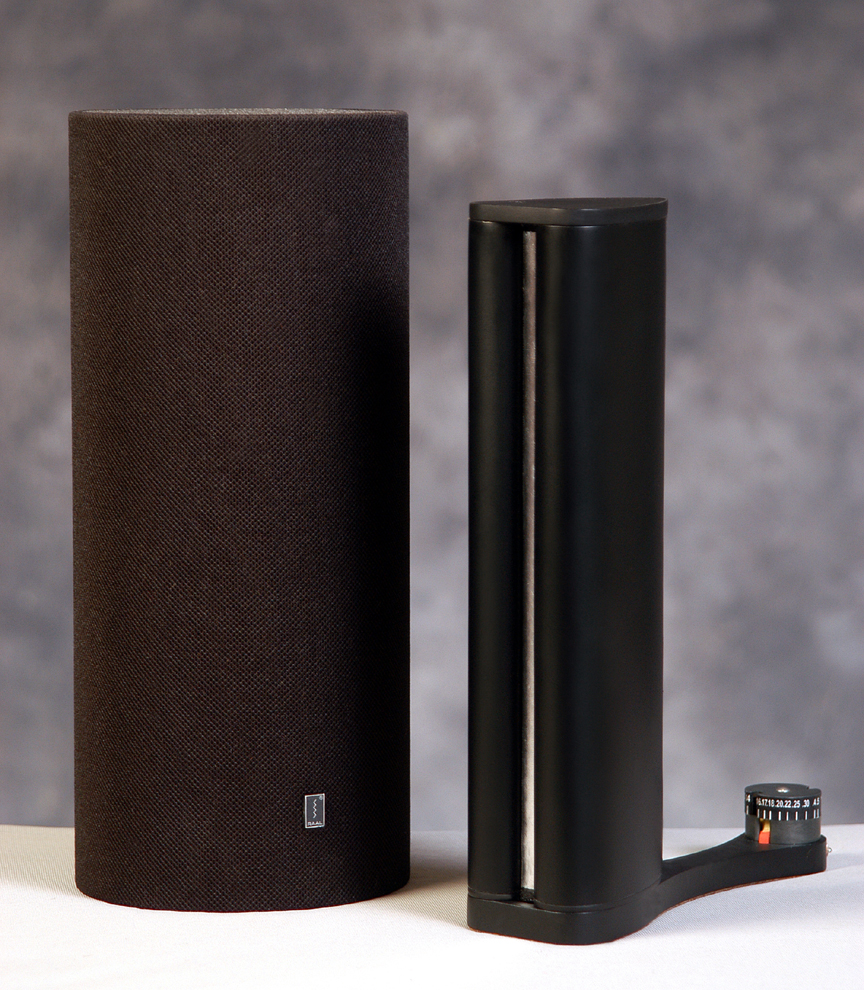
Anyhow, I went to a fabric store and fond a very good material that I like a lot. It is a very fine net made from cloth but it has no hair of any kid. In fact it is plastic fabrics. It is absolutely transparent and has literally no mass. It reminds me the material the women’s stockings are made from. I bought a few yards and tossed it on the driver. It has no sonic consequences but it kind of metals isolates the driver from its environment. In fact I fell that it even looks better in context of the entire Macondo and the Water Drop’s position become less prominent visually….
The caT
|
|
|
|
Posted by Romy the Cat on
02-21-2007
|
|
I had many interesting listening experiences while I used the Water Drop’s Macondo. I would try to surmise briefly the sonic consequences of the Water Drooping. “Me” and “briefly”, would it be possible? Well, where did you see a Jewish boy who refuses to say 500 words where he could say 25?
There are few major sonic influences that Water Drop had to my playback. I will start from the first (with any order): the lowering of mechanical stress during the summit of crescendos.
People who know me know that I do not mind to play music loud. One of the reasons is because I can. Most of playback can’t play loud as loudness brings compression. Most of systems out there juts fall apart with volume. (They have of multiple different reasons that is not the subject of this thread). The Macondo does not care about loudness and permits to play as loud as I wish until it because literally painful (if electricity is good, as if it is not then it compresses everything as much as any other playback). Sure Macondo as any other playback begins to distort at high volume but it does not destroys the fabrics of Sound and keeps the integrity all the way up in the volume, perhaps distorted but intact…. However, the compression drivers are atrocious and brutal. If at noramal listening levels the “dynamic atrocity” of the Vitavox S2 articulation works wonder then at high volume it becomes a bitch. In contrary to any other transducer topology the best of the compression drivers demonstrate an amassing tolerance to dynamic stresses. If a horn driver sounds in a certain way then it maintains it’s sound with increase of “dynamic pointer” until the driver’s voice coil is evaporated. Any other know to me transducers topologies gradually change their identity while volume goes up.
I DO NOT LIKE the chameleon-type behavior of drivers of other topology and I DO NOT LIKE the stubbornness and unintelligence of compression drivers. In live sound something DOES change with volume go up. Most likely our hearing use different perceivable harmonic pattern at different volumes. I do not know the answers but I know when “it is wrong”. The Vitavox shoots dynamically straight, blindly and in a way stupidly, however supplemented with the Water Drop the volume stress and particularly the upper MF volume stress, begin to demonstrate some signs of sensible adaptive behavior.
The end of orchestral crescendos in live music are just sonic evens but not the events of our perception. When an orchestra or a group of instruments hit their highest volumes we recognize it as LOUDER SOUND but our brain does not create an “EVENT OF PERCEPTION”. With playback systems it is different: when sound becomes louder in playback something in this sound says to our awareness that we should begin to recognize sound differently. I do not know what it is defiantly; through I invented many theories about hearing sub-consciousness protective mechanisms as a reaction to the alien sounds of byproducts of electronic contamination. However, what I do know that the introduction of the Water Drop does move listening awareness toward a positive tolerance and a comfort during the playback’s dynamic stresses. It is NOT PERFECT YET but IT IS NOT SMALL EITHER. In fact, that smoothing of dynamic roughness and the softness of dynamic granularity is very much prudent and it is much worth of getting, and partially for us, the guys who run horn installations. To total result does not yet behaved as “tax free” as live sound but it is a certainly a move into a very right direction.
For an illustration let take the Mravinsky’s recordings from 1961. Who else in the history of recording music was capable to demonstrate so nuancefully the INTRICACY OF DYNAMIC CONTRAST ACCROSS OF ALL DYNAMIC LEVELS? The Mravinsky’s Xray-like articulation (with right vintage of his orchestra) is equally stunning during the Mravinsky’s wildest fortes and during the moments when the Mravinsky’s orchestra is sinks in ambianic dark… Lets take the London-recorded Tchaikovsky's 4th Symphony, the last movement…
That last movement is hardly musical it rather an orchestral freaks show. It is not just fast and grotesquely articulate but it is also a statement audio brutality made in very poor, typical Russian, orchestral sound. What Mravinsky did was shockingly good and the way in which the musicians had “rendered” that last movement was astonishing. But that tone of the Leningrad Philharmonic to my ears sounds like a weapon of orchestral mass distraction. The strings are fine but when they dive into chopping then they, for whatever reasons, sounded WAY more annoying then any other orchestra. The tonal quality of brasses when they play loud make my Cat (an me) to hide under my bed. When the trumpets and horns scream that “fate thyme” they sound so “aggravated” that I need 2 hours of recovery with Vienna or Prague Philharmonic… I never head the Leningrad Philharmonic live and I am familiar with them only by recordings. So, I was under impression that it WAS the Leningrad Philharmonic’s sound. Well, not after the Water Drop come to the play. A couple days back I was playing that last movement (many times) and was VERY surprised what the Water Drop did to sound, and partiality at high volumes. It made me to view the brutality of Mravinsky interpretation very-very differently as by removing the HF artificial irritations at high volume it opened up a lot a lot of reasoning behind some of the things that Mravinsky/Leningrad did. In fact the entire last movement of the Tchaikovsky's 4th with Water Droped Macondo does not sound to me any more like brow-rising freak-show but rather it more sounds like a superb and very WELL-THOUGHT AND WELL-BALANCED PERFORMANCE… Quite an experience I have to say and quite a lot of yield from juts one tweeter… More will be coming…
|
|
|
|
Posted by Romy the Cat on
02-21-2007
|
|
Another very interesting aspect of the Water Dropping of Macondo is a dramatization of silences and influence of LF decay. Macondo has no own noise and the Super Milqs are dead quiet. However, the perceptions of silence with the Water Drop tweeter and without it are different.
I always thought that the character with which orchestra decays into silence is purely a property of reverberation time at low frequency in a given listening room. I have head some stunningly sounding rooms, made so smartly that when a good orchestra went into silence the rooms demonstrated so “un-fucking-believable conviction” that I was tempting to jump form my listening chair and run, chasing that collapsing sound. After that, I spent years on more or less successfully experimenting with delay channels, artificially mocking up the desirable RT60 patterns… Well, I assure you that I have quite developed and quite acquired taste on the subject…
So, how bug was my surprise when the Water Dropping changed the decay perception in my room. Sure, I know about the relation between UHF and ULF and softening of LF is something that I was perfectly expected from a good tweeter (in my vocabulary “fast bass” is insulting phrase). What I was not expecting the degree in which it took place and it’s affect to decay. I would say that subjectively the orchestral decay with the Water Drop is equivalent to an extension of reverberation time 1.5 times. Any person who knows the subject would read it at tell you that I’m a patz. If I read someone ease say it I would surely presume that the person is an idiot. However, it is what it is and I do testify that when I increase the reverberation time in my room approximately 1.5 times then I have subjectively have the same decaying affects as when the Macondo is Water Dropped. However, with the Water Drop tweeter it even more fan as it has an ability to “pump drama” into in silence. The silence is a silence but with Water Drop for whatever reasons THE SILENCE IS MORE PREGNANT WITH EVENTS. It feels like the Water Dropped silence is contaminated with some kind of deadly micro-organisms that might eventually grow up into the “War of the Wars” monsters…
Anyhow, whatever it is I find it is very-very positive change and it looks like this effect is not depending from a crossover point. I would LOVE to hear the Water Dropping in a large room of 1500-1700cu feet in context of a proper installation that would be capable to do bass … proper. It might be a very educational to experience and I wonder if the silence dramatization and effect of subjective LF decay prolonging will take please in a large room.
The Cat
|
|